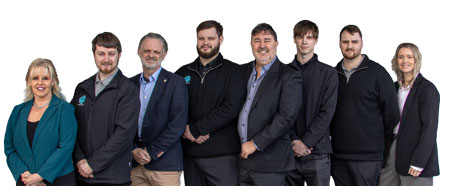As we approach the end of year and reflect on the trials we've faced, we've perhaps wished that we were better prepared for the headaches we've endured. Most would say we've learned what to expect now if we face such circumstances again, just like those lessons from the quakes 10 years ago. Awareness and preparedness. Insurance, bottled water and a little non-perishable food stashed aside would be common for Christchurch households these days. We're all looking forward to putting this year behind us and thinking about what 2021 will look like. What will we do differently this year? How do we prepare?
For 2021, our new year’s resolution is to make sure all our customers are prepared for events that are within our ability to help prevent. The one thing we saw coming through our doors 10 years ago, more than anything else, was damaged hard drives, and as a result more pain to heap on top of everything else as people learned they had lost precious memories and important work.
A common phrase in our industry is there are two kinds of people. Those who have never lost data, and those with backups.
A backup is insurance against that pain. Everyone should have a backup. Many put off sorting one out or maintaining one properly until a painful lesson is learned.
Prevention is better than cure!
There are a couple of things we can do to help and one of them you've probably already received an e-mail about. Until December 10th we are doing free checks of your backup software and drives. Pop-in to see us before 3pm on Dec 10th, and we can book your laptop/desktop in for this check. We run your backup drive through our diagnostic software and assess if it is still healthy and reliable, or if it might need replacing. We also ensure your backup software is set up correctly, backing up the right things and actually doing the backup. You'll be amazed how many don't! Remember, if your backup drive is unwell or something isn't setup right, then you don't have a backup.
The other thing we encourage is annual servicing of your machines. We offer a wonderfully good membership program for this very reason. $140 buys your computer a health check and a membership for a free annual follow-up health check on the anniversary of the first one, for the rest of the machine's life. We'll remind you to bring it in and give you early warning of issues before they get more dire and more expensive to resolve. This check-up includes your backup as well.
So, what ISN'T a backup?
Storing all your files on an external drive is not a backup. Drives might be sold as "backup drives", but this doesn't mean they have any special properties that guard your data. They are simply suitable for creating backups. They are no more reliable than the drives already in your computer.
Manually copying files to a USB flash/pen drive isn't a backup. Aside from the ease of losing a pen drive and the risk of corrupting their contents if you don't safely remove them. These drives often have limitations about the size of files they can hold and this approach doesn't cover your software and other information. It is also difficult to keep track of whether you've got the latest copy of particular documents copied to them. Pen drives are for sharing or transporting files, rather than a long-term storage option.
Storing things in the Cloud isn't a backup. Cloud storage is for collaboration, sharing and ease of accessibility when you're away from home/work and sharing between devices. It would seem that Cloud Storage would be an obvious good choice for keeping things backed-up as it then becomes somebody else’s responsibility to keep your data safe. But read the terms of use and you'll find they make no promises about the safety of your data and specifically state you are responsible for your own backups. Cloud storage for the purposes of backup is a more expensive, specialised service, where it's clear up-front that it covers backups and redundancies at their end at multiple locations. Your regular Cloud services also do not cover software and other information. In the event of an incident, you're constrained by several factors:
How fast is your internet connection to download it all again? Can you remember your account details? The e-mail address and password? Do you remember your security questions and answers? Do you have one of these services now? Do you keep the above details stored on the same device that service is supposed to be covering? Are you happy to deal with their support department if something goes wrong or you get locked out of the account? What if your monthly payment doesn't go through?
And that brings us to the last, and for some a deal breaking point, the cost. The more you store online, the greater that monthly cost is.
So what IS a proper backup?
It is a one to one copy of everything on your computer. Operating System, Software, Documents and settings.... EVERYTHING.
If your hard drive faults, a proper backup can mean getting back up and running FAST. Restoring Windows/macOS, Software, Documents, E-Mail and more, exactly as it was before the drive failed. This saves time, money and headaches of needing to find license keys for your software, trying to remember e-mail passwords, re-creating contacts and getting used to a bunch of changes.
If you make an edit to a document and decide you'd like to revert that change, with a proper backup, you can choose from multiple revisions captured during previous backups to go back to.
Proper backup software and an external hard drive are what we recommend. This is the most thorough and best value solution which gives you complete control over your own data. Proper backup software helps with making sure backups occur on a regular basis and/or help guard against new threats to cloud storage and backup drives from Ransomware. Ransomware is the new breed of virus that scrambles your files and tries to extort money from you to have them unscrambled. Ransomware gets ever nastier and smarter all the time, now actively searching for attached drives and cloud accounts to trash, cutting-off avenues to avoid paying the ransom. The software we provide stores your backups in protected container files and can safely power-off your backup drive after every backup to ensure a minimum window of exposure to possible ransomware attacks.
Regular backups are important and depending on the circumstances a tailored backup scheme might be needed. A good example of this is an automotive parts wholesaler that had been sold a server with only one nightly backup of just their accounting database. The server was not built as it should have been, with an always running internal backup drive. When the drive in the server failed one afternoon, they lost hundreds of transactions records, since they only had a backup from the night before. They had to rely on the honesty of their customers to pay their invoices and the server and all it's needed software needed to be rebuilt from scratch. They switched computer companies after that.
The 3-2-1! golden rule of backup!
3 Copies of your data, 2 backups, 1 of which is not in the same location as the others.
Fire, theft, flood and any number of things can happen, as we've painfully learnt. This is where cloud storage can actually be useful. As a selective, last ditch copy of your most precious data, kept on the internet, this can meet the third requirement of the golden rule. But the same caveats mentioned above still apply. A second option is a second backup drive which you regularly swap. Taking them back and forth between work and home for example or storing one inside a fire safe in a different building. The golden rule is best practice for guarding against the worst that can happen.
What if I don't sort-out a backup?
This is where things get painful. If you have a damaged or faulty drive, it may simply be impossible to get your data back and there isn't any amount of money that will change that fact. Getting data back after the problem has already occurred relies on pure luck.
Professional Data Recovery Services start at $500+GST for non-commercial customers, sometimes with a "no success, no fee" policy, sometimes not, dependant on the Lab doing the work. There are no guarantees of success. There are no guarantees about how much you'll get back and what state the recovered data is in.
Some devices like MacBooks, iPhones, tablets, laptops and more, come with drive encryption by default as a sales feature aimed at protecting your privacy in the event of theft. This unfortunately almost guarantees data will not be recoverable if the device faults.
How often do drives fault or fail?
5.1% of Hard Drives fault or fail within the first 18 months. An additional 1.7% between 18 months to 3 years. Then from the age of 3 to 4 years, 11.8%.
So in short, one in five hard drives will require replacement within 4 years.
These figures come from statistics provided by a data hosting company about their own failure rates with the drives they use, averaged from thousands of different brands and models.
Figures are better for Solid State Drives, but they aren't bulletproof either and failure rates cannot be too generalised between differing brands, models and generations.
We're not trying to scare you
This is like the conversation you have with your GP. Better diet and exercise, or you may face unpleasant and uncorrectable complications in the future. It's easy to think that you'll get around to fixing your diet later or take up exercise when the weather is more agreeable. It's easy to put off dealing with things that "might" happen in the "future". But when you compare two patients given the same advice and one took it at the time, the future is much happier for one of those patients.
This is our advice and prognosis. We're here to help if you want it. The check-up we're offering is completely free and we'll contact you if we find any fault or any parts or anything else that might require cost. You can then decide what you would like to do based on the information we provide.
Stay safe and have a Merry Christmas and a hopefully wonderful new year.
- Paul



